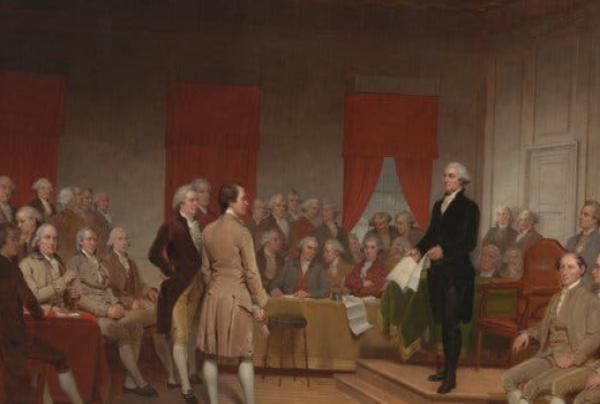The United States Constitution is in trouble. After Donald Trump lost the 2020 election he called for the termination of all rules regulations and articles even those found in the Constitution.
Outraged critics denounced him for threatening a document that is supposed to be sacrosanct. By announcing his desire to throw off constitutional constraints in order to satisfy his personal ambitions Trump was making his authoritarian inclinations abundantly clear.
It’s no surprise then that liberals charge Trump with being a menace to the Constitution. But his presidency and the prospect of his re election have also generated another very different argument: that Trump owes his political ascent to the Constitution making him a beneficiary of a document that is essentially antidemocratic and in this day and age increasingly dysfunctional.
After all Trump became president in 2016 after losing the popular vote but winning the Electoral College Article II.
He appointed three justices to the Supreme Court Article III two of whom were confirmed by senators representing just 44 percent of the population Article I.Those three justices helped overturn Roe v. Wade a reversal with which most Americans disagreed. The eminent legal scholar Erwin Chemerinsky worried about opinion polls showing a dramatic loss of faith in democracy writes in his new book No Democracy Lasts Forever : It is important for Americans to see that these failures stem from the Constitution itself.
Back in 2018 Chemerinsky the dean of Berkeley’s law school still seemed to place considerable faith in the Constitution pleading with fellow progressives in his book We the People not to turn their back on the Constitution and the courts.
By contrast No Democracy Lasts Forever is markedly pessimistic. Asserting that the Constitution which is famously difficult to amend has put the country in grave danger Chemerinsky lays out what would need to happen for a new constitutional convention and in the book’s more somber moments he entertains the possibility of secession.
West Coast states might form a nation called Pacifica. Red states might form their own country. He hopes that any divorce if it comes will be peaceful.
The prospect of secession sounds extreme but in suggesting that the Constitution could hasten the end of American democracy Chemerinsky is far from alone.
The argument that what ails the country’s politics isn’t simply the president or Congress or the Supreme Court but the founding document that presides over all three has been gaining traction especially among liberals.
Books and op eds critiquing the Constitution have proliferated. Scholars are arguing that the Constitution has incentivized what Steven Levitsky and Daniel Ziblatt call a Tyranny of the Minority.
The anguish is in some sense a flip side of veneration. Americans have long assumed that the Constitution could save us a growing chorus now wonders whether we need to be saved from it.
Born of Compromise and ContradictionIn 1787 when 55 delegates convened in Philadelphia to revise the Articles of Confederation they ended up embarking on a project that was much bigger in scope.
As Americans are taught in history class the delegates drafted a new document establishing a national government consisting of three branches legislative judiciary and executive each functioning as a check on the others.
The delegates were all white and they were all men. But they nevertheless diverged on what they deemed to be an intractable issue: slavery.
Though several states had already passed abolition statutes nearly half the delegates were slaveholders.
The Constitution was thus born of compromise with the enslavers getting the better end of the deal.
To determine representation in the House and the Electoral College the Three Fifths Compromise allowed slave states to count three out of every five people held in bondage none of whom needless to say could vote.
And the fugitive slave clause stipulated that even when enslaved people escaped to free states they would never be free.

